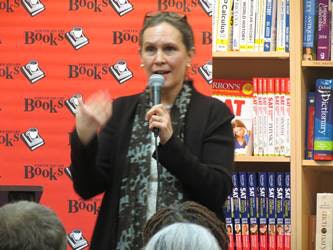The idea of White privilege is often danced around in conversations about social justice. At the National Conference on Diversity, Race and Learning on the campus of The Ohio State University this week, scholars discussed the implications of said privilege and how it impacts the campus environment.
Debby Irving, a racial justice educator and author of Waking Up White, said she did not realize the ways in which her White privilege narrowed her perspective of the world and the way things work.
For those Whites who want to think of themselves as more liberal, not racist, Irving said, there is often a difficult balance between wanting to “feel generous and feel good and [do things that] go to the need to ‘fix’” the problems these students were facing and not appearing to see herself as better than those who needed the “fixing.”
“There was a dissonance between saying I was colorblind and not wanting to look like I saw myself as superior,” said Irving. For her, this would manifest itself as having lower standards for Black students or dancing around issues in parent-teacher conferences with Black families.
 Debby Irving, a racial justice educator and author, said that those in power need to be willing to engage in dialogue with those who are not in power about ways to better accommodate them.
Debby Irving, a racial justice educator and author, said that those in power need to be willing to engage in dialogue with those who are not in power about ways to better accommodate them.
“The world is normalized to be White,” Torres said. “Most of the policymakers, most of the faculty, because most of the great majority of them are White, they don’t think about some of those issues and challenges that people of color go through.”
Torres went on to say that workshops and symposia will not likely truly unpack the complications of privilege for those who don’t have the lived experiences of being on the short end of the privilege.
“I think that a lot of people talk about stuff and they can ‘learn’ things via workshops or books, but unless they live through it or know someone that lives through it, they’re not going to get it,” he said. “If you think about privilege, you don’t think about things and you kind of have that ‘aha’ moment, but if there is not an example that you can relate to, unless it smacks you in the face,” you’ll still never truly be able to identify with those who have been on the negative end of the privilege, he said.
Torres said that, for White faculty and staff, the need for self-fulfillment on Maslow’s hierarchy of needs puts them in a position to try to give back to non-White students and faculty. But for people of color, if basic needs are not met and access to resources — even professional development resources — is not met, then they cannot even ascend Maslow’s pyramid to reach self-fulfillment.
For Irving, the self-fulfillment came in the form of going into underserved communities to try to teach and “fix” the problems facing students of color.
“It sounds so warm and fuzzy, and yet if that power dynamic is still in play, it is still this group of people deciding what’s right for another group,” Irving said.
And for many people of color, the representation in power is still lacking.
Torres said he still finds himself going above and beyond and doing things his White colleagues are not doing to overcome the privilege and “pass” as certain social demographics that will benefit him.
“I consciously do things to pass because that’s what’s going to get me the things that I need, those resources that other people take for granted,” he said.
Torres feels “obligated to wear this suit, because if not, I’m just a Hispanic guy,” often intentionally wearing pastel colors because they are less threatening and better “fit in with that preppy image” and doing other “things that I feel are necessary for me to be able to reach the resources that other people just have inherently.
“I see myself, and maybe it’s purposely, maybe it’s not, but I see myself falling into these roles of what’s going to keep me safe, and that’s something that those in situations of privilege don’t even think about,” said Torres.
“I don’t consider myself to have a chip on my shoulder, but I do those things that are going to, one, keep me safe, and two, get me access to the resources that I need,” he said.
Irving said that for those in the majority and those in positions of power, it is imperative that they learn to challenge what is comfortable for them and confront the issues head on, and be willing to engage in dialogue with those who are not in power about ways to better accommodate them.
“We have to deal with the basics first,” said Torres, which he says includes understanding that there are differences, “and hopefully, after we do that, we can get to some of the bigger stuff.”
At the top of the list is realizing that “it is not a level playing field,” he said.















